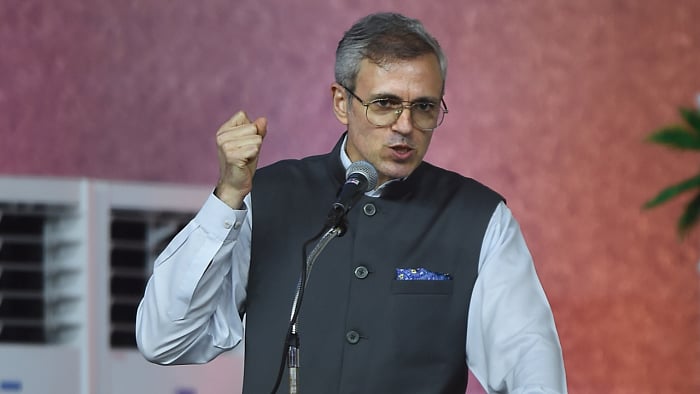
Omar Abdullah.
Credit: PTI File Photo
Placing an elected chief minister of a Union Territory under house arrest and using force to prevent him from attending an event that he considers important is unusual.
It becomes particularly strange when the action is ordered by an appointed administrator. That is what happened with the Chief Minister of Jammu and Kashmir, Omar Abdullah, who was placed under house arrest on July 13 which is commemorated by Kashmiris as Martyrs’ Day.
The day marks the gunning down of 22 people who were part of a large gathering outside the Srinagar jail, by the Dogra police, in 1931. People in Kashmir consider the incident as their Jallianwala Bagh – the trigger to a democratic awakening and a resistance against the Dogra rule in the region. Abdullah defied police restrictions to scale a cemetery wall, to pay tributes to the martyrs. He was also extremely critical of the Lieutenant-Governor’s administration – “They say this is a free country but sometimes, they think this is their estate, and we are their subjects. But we are not anyone’s slaves.”
Martyrs’ Day and December 5, the birth anniversary of Sheikh Abdullah who led the democratic movement, were public holidays in Kashmir. The L-G administration has scrapped these two holidays and declared the birth anniversary of Dogra monarch Maharaja Hari Singh as an official holiday. Clearly, the administration in the UT does not acknowledge Kashmir’s democratic movement and considers the Dogra rule a legitimate government that was wrongly challenged by the protesters. This is denial and in effect, a rewriting of history, the way it is being done in other parts of the country. In the collective Kashmiri conscience, the Dogra rule symbolises tyranny and autocracy. By glorifying it and slighting the democratic movement, the administration was disrespecting the people’s sentiment – and it could not have acted without the Centre’s backing.
It is the same lack of respect for popular sentiment that drives the decision to put a chief minister under house arrest. These are unprecedented developments, difficult to imagine in a democratic system. But this is Kashmir, where many of the elected government’s powers were taken away and vested in the Lieutenant-Governor before the new government took charge. The promise of statehood made to the people has not been fulfilled. The administration’s actions can only create distrust and alienate people from it. A chief minister scaling a wall in defiance is a troubling image. The events on Martyrs’ Day further emphasise the distance between Kashmir and the Centre.
